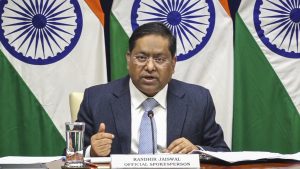Washington D.C. – The United States announced comprehensive Trump Russia sanctions on Wednesday, marking the first time President Donald Trump has imposed Ukraine-related penalties on Russia during his second term. The sanctions specifically target Russian oil companies as a direct response to Russia’s lack of serious commitment to a peace process aimed at ending the war in Ukraine. These Trump Russia sanctions represent a significant escalation in Washington’s approach toward Moscow as frustration mounts over the ongoing conflict.
President Trump shared the announcement on Truth Social, posting a statement from the US Department of the Treasury titled “Treasury sanctions major Russian oil companies, calls on Moscow to immediately agree to ceasefire.” The timing of these Trump Russia sanctions comes as the Ukraine conflict approaches its fourth year, with international pressure intensifying for a resolution.
Major Russian Oil Companies Targeted
The Trump Russia sanctions specifically target two of Russia’s largest oil companies: Open Joint Stock Company Rosneft Oil Company (Rosneft) and Lukoil OAO (Lukoil). These energy giants play a crucial role in funding Russia’s military operations and represent significant revenue sources for the Kremlin.


Treasury Secretary Scott Bessent emphasized the severity of the situation in his statement: “Given President Putin’s refusal to end this senseless war, Treasury is sanctioning Russia’s two largest oil companies that fund the Kremlin’s war machine. Treasury is prepared to take further action if necessary to support President Trump’s effort to end yet another war. We encourage our allies to join us in and adhere to these sanctions.”
Impact on Russian Energy Sector
Rosneft operates as a vertically integrated energy company specializing in exploration, extraction, production, refining, transport, and sale of petroleum, natural gas, and petroleum products. Lukoil engages in exploration, production, refining, marketing, and distribution of oil and gas both domestically in Russia and internationally. The Trump Russia sanctions against these companies represent a substantial blow to Russia’s energy infrastructure and economic stability.
The United Kingdom also sanctioned both firms last week, demonstrating coordinated international pressure. Additionally, the European Union approved its 19th package of sanctions against Moscow on Wednesday, which included a ban on Russian natural gas imports, further tightening the economic noose around Russia’s energy sector.
Trump’s Claims About India and Russian Oil


The Trump Russia sanctions announcement comes amid repeated claims by President Trump that Prime Minister Narendra Modi has assured him India will “not buy much oil” from Russia. During Diwali celebrations at the White House on Tuesday, Trump stated he had a call with Modi regarding Russian oil purchases.
Also Read: Trump Indian Oil Purchase Halt Claim: Bold Prediction on India’s 60% Russian Oil Cut
“I spoke to Prime Minister Modi…and we just have a very good relationship, and he’s not gonna buy much oil from Russia. He wants to see that war end as much as I do,” Trump said. He added, “He wants to see the war end with Russia-Ukraine and, as you know, they’re not going to be buying too much oil. So they’ve cut it way back and they’re continuing to cut it way back.”
India’s Response and Current Tariff Situation


Indian officials did not immediately respond to Trump’s latest remarks on Russian oil purchases. Last week, when questioned about similar claims, Ministry of External Affairs spokesperson Randhir Jaiswal stated he was “not aware” of any such conversation between the two leaders.
Trump responded to India’s denial by warning, “But if they want to say that, then they’ll just continue to pay massive tariffs, and they don’t want to do that.” Currently, India faces 50 percent tariffs imposed by the US, with half specifically implemented as punishment for purchasing oil from Russia. This situation highlights the complex interplay between the Trump Russia sanctions strategy and broader geopolitical relationships.
Trump-Putin Meeting Cancelled
Despite the Trump Russia sanctions, diplomatic channels remain complex. Days after a potential meeting between Trump and Putin was announced to be held within two weeks in Budapest, the White House on Tuesday stated the US President had “no plans” of meeting his Russian counterpart “in the immediate future.”
On Wednesday, while addressing the press with NATO Secretary General Mark Rutte, Trump confirmed, “We cancelled the meeting with President Putin. It just didn’t feel right to me.” However, US Secretary of State Marco Rubio indicated on Wednesday while leaving for the Middle East that the US would still like to meet with Russia despite the announced sanctions.
International Coordination and Future Actions
The Trump Russia sanctions reflect coordinated efforts with international allies to pressure Moscow into ending the Ukraine conflict. Treasury Secretary Bessent’s statement emphasized readiness to take further action if necessary, suggesting these sanctions may be just the beginning of escalated measures.
The effectiveness of these Trump Russia sanctions will depend on international cooperation and enforcement, particularly as global energy markets adjust to these new restrictions on major Russian oil producers.

